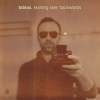It’s no easy task beginning to provide commentary on the work of a producer whose career in music carries the magnitude of Tobias Freund’s. With a career that spans four decades, the German producer fits more ably into the role of artist rather than as something as thinly defined as producer, particularly within an age where anyone with a computer and a sound card can label themselves as such. His first solo album under his tobias. moniker befits that role of artist with the revered Freund exploring the structures and rhythms of his musical experiments, paying no heed to trends, dance floor pay-offs or expectations from an instant-gratification prone consumer. Leaning Over Backwards, then, is an album that gracefully sidesteps expectation, revealing the work of an artist interested only in expounding his theories through working practice. That practice is worked through with a largely analog aesthetic, Freund dismissing the easy advantages of using systems such as Ableton as being too formulaic and essentially emotionless, choosing instead the mechanical thrum of analog gear to patch together more varied results.
These results start with the low-end, pulsing murmur of “Girts,” its muddied percussion trying to push through — but existing somewhere just below the surface of a vaporous swell of white noise and bass. Freund moves into more upbeat territory with “Party Town,” a track based around a single, throbbing, off-beat chord and a bare minimum of percussion to accent the atmospheric, nocturnal sounds that add texture to the track. Like “Skippy,” it is driven by a circuitous groove rather than by progressive melodies and arrangements. The latter track though swaps out the incessant chord stab for a repetitive vocal snippet, the word becoming more ambiguous as the track goes on, one of those tunes that seriously mess with your brain when you hear it out at a club. The only other real floor cut on the album is “We Stick To The Plan,” which, though similarly understated, possesses more of a feeling of organic movement rather than the mechanical kinetics of “Party Town” and “Skippy.” Slight synth chords detach themselves from the steady, undulating bass line, releasing complimentary metallic reverberations that are accented by such light touches of percussion they work almost subliminally. The title track, although driven by a 4/4 beat, doesn’t really qualify as serious dance floor material, its hollow kick drum not forceful enough to create anything more than a surge in the atmospheric nature of the track. That atmosphere sounds very much like an ethereal stay in an airport transit terminal, the sounds of jet engines tuned to a haunted timbre, the PA system crackling with incoherent vocoded messages.
As experimental as these tracks are, the rest of the album diverges even further into empirical territory, Freund coaxing out an unsettling, arpeggiated beauty from “Voices Told Me To Do That” that sounds like off-cut melodies from an Aphex Twin Analogue Bubblebath work married with muffled, mud splattered drums. “Zero Tolerance” charts a tension-filled four-and-a-half minutes of passive aggressive relationship monologue bubbling up under a palpitating rhythm that plays out like the internal pulse of blood pressure, increasing to the point where it is an audible cadence in the ears and temples. “Free No.1” is a slow-mo electro cut wired with gently evolving synth lines that sounds like Drexciya on temazepam. Freund further explores electro on “The Key,” this time with even more obvious Detroit overtones, sounding like a close relative to Carl Craig’s classic “Televised Green Smoke.” It is these free-form excursions that really give weight to the album, but will no doubt also divide potential consumers on whether they will purchase an Ostgut Ton release that is primarily made for home listening. When considering the quality and the scope of the album however, this shouldn’t really factor into that decision. As Freund has said himself on its making, he wanted to create a classic album that was a listening experience, something you would still want to listen to in 10 years. And with all the intricacies and buried details of Leaning Over Backwards, tobias. has done just that.

















This sounds like it’s gonna suceed 2 his expectations of a classic LP. I loved “The Key” & i wish Tobias the best.